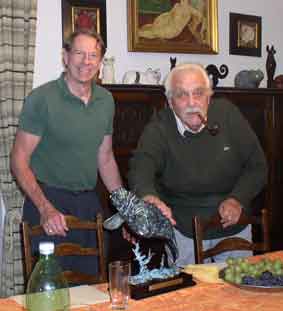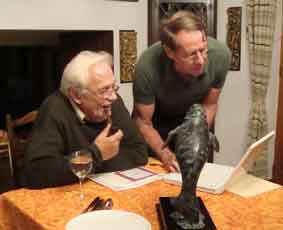 .
.  .
. 
Presenting the "Siren Award" and website to Stjepan Keckes in 2009
Arthur Lyon Dahl
Dr. Stjepan Keckes was a Yugoslav marine scientist and one of the early staff members of the United Nations Environment Programme. He had built the Regional Seas Programme with a small team in Geneva, starting in 1974 with the Mediterranean Action Plan. I started at the same time at the South Pacific Commission building what became the South Pacific Regional Environment Programme, and began a collaboration with UNEP through Maurice Strong. After considerable difficulties with the UNEP regional office in Bangkok, responsibility was transferred to Regional Seas which was fully supportive (the difference was like night and day), and SPREP was adopted in 1982 as one of the Regional Seas programmes with UNEP as a partner.
When the Executive Director ordered Regional Seas to move to UNEP headquarters in Nairobi, Stjepan resigned in protest, saying it was not possible to work efficiently from Nairobi where communications were poor, and far from the other UN agency partners in Regional Seas. His staff resigned as well in sympathy. All that was moved were the files and one secretary. (He continued to resign occasionally over matters of principle, but was always talked into staying on.)
Stjepan was finally convinced to move to Nairobi and re-establish the Oceans and Coastal Areas Programme Activity Centre (OCA/PAC) there (he said later that this was the biggest mistake of his career). He asked me to come as a consultant to help him get things started and to recruit and train his new staff over several three-month periods. He picked the location in the Giriri compound as far as possible from the rest of UNEP, to try to avoid entanglement in the bureaucracy, which he could not support. For him, efficiency and effectiveness in being of service to the governments of our regions were all-important.
On one of these consultancies, Stjepan called me in and said the Executive Director had decided it would be desirable to have an American as Deputy to the Director of OCA/PAC to encourage US funding of the progamme, and invited me to apply for the post. Thus in March 1989 I became his deputy, a decision I have never regretted. Stjepan was a tremendous director to work for, demanding the highest standards while creating a strong team spirit. If you were competent, you were completely supported; if not, you were made so uncomfortable you preferred to leave.
One of my first assignments was to "read the files" on the East Asian Seas programme and get activity started again. The OCA/PAC filing system was legendary across the whole UN system: a large room of floor to ceiling shelving filled with files systematically organized by activity, region, organization, etc. All incoming correspondence was stamped and dated, actioned to the relevant programme officer with information copies as necessary, with action taken noted and dated as well, and then filed. Anyone replacing an absent officer, for example, could go to the files and find exactly where everything stood, what had previously been done and what further action was needed. Older files were in an equally large archive downstairs. I found this so useful that I developed and maintained similar filing systems for the rest of my UN career.
There was a daily OCA/PAC staff meeting at 10:00 so that issues could be discussed and everyone informed of the progress of the programme. We all reported briefly on our areas of responsibility and received guidance as appropriate. No detail escaped Stjepan's attention. He would sometimes complain that he had found some letters misfiled, and the secretary of the officer concerned should be more careful. On one occasion he reported that there were some errors in the index of the OCA/PAC publications catalogue and that the whole thing should be rechecked.
As he was approaching retirement, he groomed me as his successor. He resigned a last time in 1991, shortly before his retirement, as a matter of principle, and stuck to it knowing that the programme would not collapse again since I was there to succeed him. (In fact, I was prevented from replacing him, but that is another story.)
Stjepan believed deeply in the principles of the UN Charter, and never wanted to put himself forward. We were faceless international civil servants working as a team, and it was inappropriate to take individual credit. When one of the other Directors decided to reserve the best place in the parking lot for himself with a sign "Reserved for Director", Stjepan pulled the sign out and threw it in the pond. He did the same to a replacement sign. On his separation from the organization, he was billed for the two signs as he had destroyed UN property. He appealed, and was finally vindicated as the signs were considered inappropriate and should never have been approved.
Stjepan's achievements in building the Regional Seas programmes showed his remarkable qualities as a scientist, diplomat and administrator, exemplified even more by his refusal to take personal credit for what was accomplished by the teams he built and led. His story should be an example to all administrators in the United Nations and a model for young people to follow.
Finally, the many people who had been touched by Stjepan during his career decided to honour him in an appropriate way. We invited the programmes he had created and eighty friends from his graduate student days through his whole career to prepare letters of appreciation, perhaps with pictures of them and their families, and created a password-protected web site in his honour. For example, there was a Kenyan office boy who did our photocopying and emptied the wastebaskets, whom Stjepan had encouraged to go on in his career, and ended up in the UN as the financial officer for the UN Framework Convention on Climate Change in Bonn. I had the privilege of going to Croatia in 2009 and presenting this web site to Stjepan, who was truly touched for the recognition that he richly deserved.
 .
.  .
. 
Presenting the "Siren Award" and website to Stjepan Keckes in 2009
Return to Life of Service page
Last updated 11 September 2020